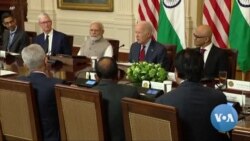Assessing the prospects for boosting U.S.-India trade as the countries forge closer ties.
Welcome to VOA Asia Weekly. I'm Chris Casquejo in Washington. That story is coming up, but first, making headlines:
The U.S. Supreme Court has ruled that race cannot be used as a factor in college admissions. The Supreme Court had previously approved of the use of affirmative action in higher education in decisions dating back to 1978.
Japanese regulators have begun a final inspection before treated radioactive wastewater is released into the Pacific Ocean from the wrecked Fukushima nuclear plant. The plan has faced fierce protests from local fishing groups and nearby countries over safety concerns. An exact date for the wastewater release is not set.
Philippine authorities rescued more than 2,700 alleged human trafficking victims on Tuesday when they raided a commercial building in a Manila suburb as part of a crackdown on a cybercrime syndicate. The victims told police they were swindled into working for fraudulent gaming sites and carrying out scamming activities.
North Korea held mass rallies Sunday in Pyongyang where people shouted slogans vowing a "war of revenge" to destroy the United States, as the country marked the 73rd anniversary of the outbreak of the Korean War, state-run television reported.
Cambodian authorities on Wednesday burned 5.7 tons of seized illegal drugs at a ceremony in the capital, Phnom Penh. The ceremonial burning of the seized drugs was done to mark International Day Against Drug Abuse and Illicit Trafficking, which was actually internationally observed on Monday.
Authorities in Myanmar destroyed more than $446 million worth of seized illegal drugs to mark the international anti-drug trafficking day Monday. The drug burn came as U.N. experts warned of increases in the production of opium, heroin and methamphetamine in Myanmar, with exports threatening to expand to markets in South and Southeast Asia.
The United States is India’s largest trading partner, with trade between the two countries currently around $191 billion in 2022. With the two forging a closer relationship, a look at the prospects for boosting U.S.-India trade.
While defense deals between the U.S. and India took center stage during Indian Prime Minister Narendra Modi’s visit to Washington last week, on the sidelines, they also spoke about bilateral trade.
“I've talked repeatedly about the need for both governments to be impatient about setting a goal of $500 billion in trade and investment between the United States and India.”
The U.S. Commerce Department says Trade with China reached more than $690 billion in 2022, but with a China favoring deficit of 383 billion.
U.S. Representative Ro Khanna from California says bilateral trade with India offers the U.S. a chance to have a more balanced relationship than the one with China.
“India, with some of the agreements, is going to be buying things from a number of our defense contractors or defense companies. So, they're helping to create jobs here in the United States, and that is where we need to learn from the mistake made with China, which was an unreciprocal trade agreement.”
The U.S. is encouraging businesses away from China and promoting what’s called “friendshoring,” or doing more business with countries that are political and economic allies, like India.
During Modi’s Washington visit, India agreed to lift retaliatory tariffs placed on U.S. aluminum and steel imports, but the U.S. kept in place its tariffs on Indian aluminum and steel, which surprised some analysts, like Inu Manak, from the Council on Foreign Relations.
“India got a pretty raw deal and it's quite surprising the Biden administration did not do anything to remove these tariffs as a signal of support for its growing relationship with India.”
Manak also says India needs to cut regulations to create a more welcoming environment for U.S. investment.
“India has had many long-standing restrictions on foreign direct investment. They have restrictions on foreign ownership.”
In the future the goal is to expand business relationships as the U.S. continues to expand its military relationship with the world’s largest democracy.
Finally, South Koreans found them themselves a year or two younger on Wednesday.
The international method of counting age has replaced the country's traditional method in which a person was deemed one-year-old at birth.
"I'm supposed to be 30 next year in the traditional Korean age system, but with this new age system, I became two years younger. It's just great to feel like you’re getting younger and I feel a bit of distance from becoming 30. I’m so happy that I can celebrate this year's birthday once again in a younger age."
Visit voanews.com for the most up-to-date stories.
Thanks for watching VOA Asia Weekly. I’m Chris Casquejo. See you next week.











